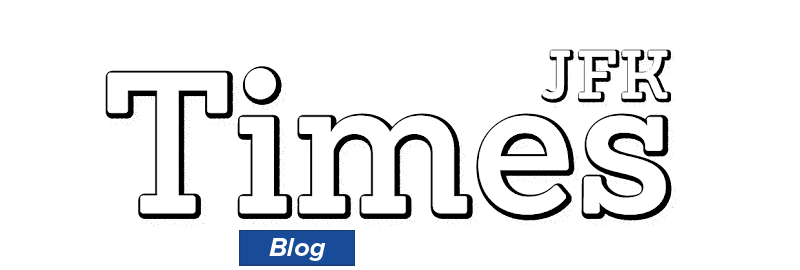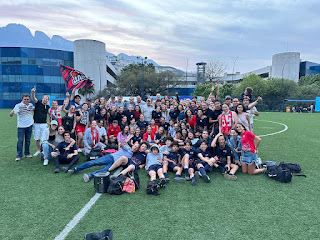Recognize the Signs, Act Immediately and Say Something!
What is “Say Something”?
Have you ever heard about something worrying that happened
to a friend or acquaintance, but you preferred to stay silent to avoid
problems? Or maybe you knew someone was in danger, but because you didn't get
involved, you didn't report it. What you may not have known is that by sharing
what you saw or heard, you could have prevented a tragedy.
Studies show that 70% of people who commit suicide mentioned
it or gave a signal to someone before making that decision. The same goes for
those who self-harm, suffer from bullying, or plan to harm others.
What is “Say Something” about?
The “Say Something” program seeks to raise awareness in our
community about the importance of Speaking up and Reporting risk signs to
prevent unfortunate situations from occurring. Through activities throughout
the school year, the program encourages all members of the JFK community,
including parents, students and staff, to take action when they notice
concerning behavior.
This program was born from the need to prevent situations that put the safety or well-being of the members of our community at risk.
The origin of “Say Something”
“Say Something Sandy Hook,” as it was originally known, was
created by the organization Sandy Hook Promise, founded by families who lost
their children in the tragic Sandy Hook school shooting on December 14, 2012 in
Connecticut, USA. This organization seeks to honor victims of gun violence
through programs that protect children and prevent the loss of life.
For more information, visit [Sandy Hook
Promise](http://www.sandyhookpromise.org).
How is it implemented at JFK?
At JFK, the program applies from 4th to 12th grade, and is
coordinated by the Student Support Services team, led by psychologist Clarisa
Montes de Oca,
Responsible by section:
- Elementary School (4th and 5th): Claudia Ángeles and Tere Cancino.
- Middle School (6th - 8th): Diana Sánchez and Rocío Aguirre
- High School (9th - 12th): Mariana Pérez and Paulina Ochoa
Warning signs that you should not ignore:
- Consumption of alcohol or other substances
- Self-harm
- Feeding problems
- Social isolation
- Extreme mood swings
- Thoughts of harming others
- Irrational fears
- Feeling of rejection
- Any behavior that endangers the physical, emotional or moral integrity of a person
How to report?
If you identify any of these signs, you have two ways to
report:
- By email to saysomething@jfk.edu.mx, providing as many details as possible, including your name so that we can follow up appropriately.
- In person with any member of the Student Support Services team.
At JFK we firmly believe in teamwork. Your collaboration is vital to keeping our community safe. Remember: Don't stay silent, you can make a difference.
------------------------------------
¿Qué es “Say Something”?
¿Alguna vez te has enterado de algo preocupante que le
sucedió a un amigo o conocido, pero preferiste quedarte callado para evitar
problemas? O tal vez has sabido de alguien que corría peligro, pero por no
involucrarte, no lo reportaste. Lo que quizá no sabías es que, al compartir lo
que viste o escuchaste, podrías haber evitado una tragedia.
Estudios muestran que el 70% de las personas que se suicidan
lo mencionaron o dieron señales a alguien antes de tomar esa decisión. Lo mismo
sucede con quienes se autolesionan, sufren de bullying o planean hacer daño a
otros.
¿En qué consiste “Say Something”?
El programa “Say Something” busca concientizar a nuestra
comunidad sobre la importancia de Hablar y Reportar señales de riesgo para
evitar que situaciones desafortunadas ocurran. A través de actividades a lo
largo del ciclo escolar, el programa alienta a todos los miembros de la
comunidad JFK, incluidos padres, estudiantes y personal, a tomar acción cuando
detecten conductas preocupantes.
Este programa nace de la necesidad de prevenir situaciones que ponen en riesgo la seguridad o el bienestar de los miembros de nuestra comunidad.
El origen de “Say Something”
“Say Something Sandy Hook”, como se le conoce originalmente,
fue creado por la organización Sandy Hook Promise, fundada por familias que
perdieron a sus hijos en el trágico tiroteo en la escuela Sandy Hook, el 14 de
diciembre de 2012 en Connecticut, EE. UU. Esta organización busca honrar a las
víctimas de la violencia armada a través de programas que protegen a los niños
y previenen la pérdida de vidas.
Para más información, visita [Sandy Hook
Promise](http://www.sandyhookpromise.org).
¿Cómo se implementa en JFK?
En JFK, el programa se aplica desde 4° hasta 12°, y es
coordinado por el equipo de Student Support Services, liderado por la psicóloga
Clarisa Montes de Oca,
Responsables por sección:
- - Elementary School (4° y 5°): Claudia Ángeles y Tere Cancino.
- - Middle School (6° - 8°): Diana Sánchez y Rocío Aguirre
- - High School (9° - 12°): Mariana Pérez y Paulina Ochoa
Señales de alerta que no debes ignorar:
- Consumo de alcohol u otras sustancias
- Autolesiones
- Problemas de alimentación
- Aislamiento social
- Cambios de humor extremos
- Pensamientos de hacer daño a otros
- Miedos irracionales
- Sensación de rechazo
- Cualquier comportamiento que ponga en peligro la integridad física, emocional o moral de una persona
¿Cómo reportar?
Si identificas alguna de estas señales, tienes dos maneras
de reportar:
- 1. Por correo electrónico a saysomething@jfk.edu.mx, proporcionando el mayor número de detalles posible, incluyendo tu nombre para que podamos hacer un seguimiento adecuado.
- 2. De manera presencial con cualquier miembro del equipo de Student Support Services.
En JFK creemos firmemente en el trabajo en equipo. Tu
colaboración es vital para mantener segura a nuestra comunidad. Recuerda: No te
quedes callado, tú puedes hacer la diferencia.
Clarisa Montes de Oca, Student Support Services Coordinator





Comments
Post a Comment